|
|
|
Sort Order |
|
|
|
Items / Page
|
|
|
|
|
|
|
| Srl | Item |
| 1 |
ID:
187539
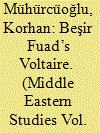

|
|
|
|
|
| Summary/Abstract |
Beşir Fuad (1852?-1887) is an obscure figure among late nineteenth century Ottoman intellectuals known for his materialistic views which were unprecedented under the Hamidian regime (1876-1909) and who shocked his contemporaries by committing suicide at an early age, leaving a note and a letter containing his last impressions and world view. Just months before his suicide, Beşir Fuad published a Voltaire biography in which he commemorates him as an Enlightenment ideal to be emulated in humankind’s struggle against religious intolerance. In this article, Beşir Fuad’s Voltaire (1886) is examined, arguing that the monograph was, though in an embryonic form, an early expression and defence of individual liberty, based on a materialistic world view that aims at demystification of the prevailing customs and morals as irrational and superstitious absurdities to pave the way for a future society in which the individual would be in liberty.
|
|
|
|
|
|
|
|
|
|
|
|
|
|
|
|
| 2 |
ID:
187547
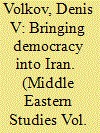

|
|
|
|
|
| Summary/Abstract |
Although the history of Russian-Iranian relations remains seriously understudied, few would refute the oppressive imperialist role played by Imperial Russia in Iran during the nineteenth century and the first two decades of the twentieth century. However, practically nothing has been written about the conceptual shifts which began to take place in Russia’s Persian policy immediately after the February Revolution of 1917. Little is known about the large-scale projects, through which Russia was to bring ‘its own democracy’ to Iranian Azerbaijan and its other northern provinces, with further proliferation all over Iran. This was meant to facilitate Russia’s political and trade expansion down to the Persian Gulf, which had been the eventual goal for many decades. Drawing on unpublished documents from Russian, British and French archives, this article studies the relevant correspondence between the Russian, British and French missions in Tehran and their central authorities during the decade 1909-1919, including the short-lived governments of Republican Russia. In doing so, it analyses the local agency of the Russian diplomats in Iran, such as Vladimir Minorsky (1877-1966), in the emergence of these projects, and investigates the manifestation of symbolic capital and the productive interaction of power/knowledge relations.
|
|
|
|
|
|
|
|
|
|
|
|
|
|
|
|
| 3 |
ID:
187548
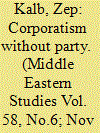

|
|
|
|
|
| Summary/Abstract |
Did the formation of the Islamic Republic of Iran empower or weaken workers? Scholars have mainly studied how regime consolidation between 1979 and 1983 weakened labor organizations. By contrast, I argue that the Iran-Iraq war (1980–88) empowered workers by compelling state actors to incorporate segments of the industrial workforce vertically into the state. Corporatism – the hierarchical integration of the state and organized groups representative of industrial labor – expanded workers’ associational bargaining power in post-revolutionary Iran. Triangulating between official and non-state archival sources, I propose three mechanisms leading to corporatist development in war-time Iran. First, inter-party and factional competition pushed state elites to accept revolutionary work councils as legitimate institutions. Second, war and international isolation forced managers, bureaucrats, and the military to support work councils in order to increase productivity and recruit worker-soldiers. Third, by asserting control over an expanding bureaucracy in charge of war mobilization, labor leaders were able to create a more autonomous organization, called the Workers’ House. In the MENA, corporatism is usually associated with authoritarian consolidation. By contrast, corporatist development in Iran led to industrial workers’ political inclusion. Corporatism in the Islamic Republic arguably improved labor rights, increased workers’ influence in policy-making, and helped broaden and institutionalize competition between political elites.
|
|
|
|
|
|
|
|
|
|
|
|
|
|
|
|
| 4 |
ID:
187542


|
|
|
|
|
| Summary/Abstract |
In the late nineteenth century, as world trade grew, figs grown along the Great Menderes Valley, Anatolia, became recognized globally for their taste. Aram Hamparzum, an Ottoman citizen of Armenian origin, contributed enormously to the figs’ prominence, by marketing them as ‘Smyrna Figs’ with the ‘Camel Brand’. Hamparzum, who also received the support of British trading houses, became known as the ‘fig king’ of the world markets, deeply impressing Western Anatolia’s producers and tradespeople with his methods, from processing to packaging. Using Turkish sources, this study focuses on Aram Hamparzum and his role in the fig market to analyze the influence of Ottoman non-Muslim subjects who directed the country’s foreign trade and the process of their withdrawal from the market and subsequent replacement by Turkish-Muslim traders. This change pushed the Izmir port to the background, and ‘Smyrna Figs’ was slowly forgotten as preference grew for cheaper figs from other countries.
|
|
|
|
|
|
|
|
|
|
|
|
|
|
|
|
| 5 |
ID:
187549
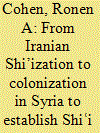

|
|
|
|
|
| Summary/Abstract |
In recent years, we have been witnessing the Islamic Republic of Iran’s process of Shi’ization in Syria and Iraq which has been labelled Al-tabshir al-shii or tashayu by prominent Arab and Muslim clerics. These include Yusuf al-Qaradhawi and Wahbe al- Zahili, a prominent Syrian Sunni cleric who saw this expansion as an aggression that ‘must be stopped’. In 2005 Abdallah II, the king of the Hashemite Kingdom, warned that the ‘Shi’ite Crescent’ circling Jordan from Khorasan in Iran all the way to Lebanon was expanding. The terms Al-tabshir al-Shii or tashayu describe this Shi’ization not only as a religious process but also as a process with geopolitical intentions – that is as an expansion of Shiʿi influence into lands, territories, and states. The main argument of this article is that Iran, with much help from the Syrian regime and Russia turning a blind eye, has been using the methods of colonization to settle Shi’ites in non-Shi’ite territories. Iran’s clear goal is to build a continuous land link between Iran, Iraq and Syria that will extend straight into the mainland of Lebanon.
|
|
|
|
|
|
|
|
|
|
|
|
|
|
|
|
| 6 |
ID:
187538


|
|
|
|
|
| Summary/Abstract |
The existing historiography on relations between Britain and the states of Lower Gulf after British withdrawal from ‘East of Suez’ in 1971 suggests that the former imperial power successfully established an informal role in the 1970s and beyond which amounted to empire in all but name. While Britain certainly sought to retain as much of its influence and as many of its interests in the economically important Lower Gulf as possible, an analysis of Anglo-Qatari relations after 1971 demonstrates that Britain’s former exclusive position was substantially eroded. British economic weakness, fierce competition from Britain’s industrial rivals, and the encroachment of the Arab world into the affairs of Qatar all militated still further against the preservation of British influence and interests, let alone the establishment of an informal imperial relationship with Qatar.
|
|
|
|
|
|
|
|
|
|
|
|
|
|
|
|
| 7 |
ID:
187540


|
|
|
|
|
| Summary/Abstract |
Contrary to the general tendency in intellectual history, where a past intellectual is usually portrayed as having a coherent thought system with minor deviations, there are various and even contradictory depictions of Ali Suavi. He was a Turkist intellectual and revolutionary, sacrificing himself to stop Abdulhamid II before the latter turned into a ‘despot’, but also an Islamist with political views akin to those of the Muslim modernists, responsible for the later regional instability in the Middle East. This article argues that, instead of a selective reading of his work to fit into one of these portrayals, a better understanding of Ali Suavi’s thought should benefit from intellectual context. It aims at reading his history of the ‘Turks’ intellectual work’ and discussion of sovereignty and ideal government as part of an ongoing conversation with the European intellectual context. This way, his praising of Turkish history and language does not merely point out a nascent Turkism, nor does his utilization of Islamic terminology and history in his formulation of ideal government only signal his Islamism, but rather they prove his conscious engagement with the European intellectual context and attempt at appropriating and translating European ideas for the late Ottoman context.
|
|
|
|
|
|
|
|
|
|
|
|
|
|
|
|
| 8 |
ID:
187541


|
|
|
|
|
| Summary/Abstract |
Kadriye Hüseyin was a member of the Egyptian ruling family and a prolific female intellectual, who has been largely ignored by scholars of late Ottoman Empire and modern Egypt. Focusing on Kadriye Huseyin’s works, which she wrote in Ottoman Turkish, this study examines the situational nature of identity in early twentieth century Egypt and, challenging the conventional narratives, argues that Ottoman consciousness continued to inform the worldviews of the Egyptian ruling elite until the First World War. The article first presents Kadriye Hüseyin as an intellectual, who identified herself as an Ottoman in various historical contexts. It then demonstrates how she was influenced by the Islamic reformist thinkers who had a major impact among the Ottoman and Egyptian intelligentsia in the early 20th century. Finally, the article introduces Kadriye Huseyin as a female intellectual, whose works argued for improving women’s status in the Muslim world from an Islamic reformist perspective.
|
|
|
|
|
|
|
|
|
|
|
|
|
|
|
|
| 9 |
ID:
187545
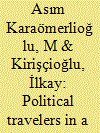

|
|
|
|
|
| Summary/Abstract |
This article intends to broaden our understanding of Turkish politics of the 1950s by focusing on the Freedom Party (1955–1958) (FP) founded by the former leading members of the Democrat Party (DP). Unlike earlier studies which mostly concentrate on the ideology and the leading political figures of the party, an attempt has been made to locate this experience in its historical context. After presenting a detailed account of the literature, we analyze the party by focusing on the power struggles of the internal factions inside the DP. By so doing, this study suggests that factionalism was a major cause of many noteworthy political developments of the era. Moreover, rather than strict ideological differences, we argue that this factionalism rested upon personal disputes and micropower struggles. Thus, the FP was born out of the DP not simply as a result of social discontent, but mainly of factionalism from within.
|
|
|
|
|
|
|
|
|
|
|
|
|
|
|
|
| 10 |
ID:
187544


|
|
|
|
|
| Summary/Abstract |
This article examines state building in Dersim with reference to local demands and the state capacity. It first analyzes how the Turkish nationalists aimed to transform the Dersim region. The focus then shifts to the local responses towards the state policies following the military operations of 1937 and 1938. I posit that the Kurds’ relation with the state relied on pragmatism and negotiation rather than outright hostility. Moreover, I demonstrate that the locals’ expectations from the state overlapped with the Turkish state’s pre-operation agenda for the most part. Despite the local endorsement, the limited state capacity constituted a major obstacle in implementing land redistribution policy and expanding road networks with limited progress. The opening of schools, however, produced somewhat mixed results in the sense that the enrollment rates did not correspond to the increase in the number of schools.
|
|
|
|
|
|
|
|
|
|
|
|
|
|
|
|
| 11 |
ID:
187537


|
|
|
|
|
| Summary/Abstract |
In the period between 1948 and 1996, two main factors consistently shaped Qatar’s attitude toward Israel: first, the support of Qatari society in general, and specifically its leadership’s support for the Palestinians. A second factor was the desire to align Qatari foreign policy with that of other Arab countries, especially Saudi Arabia. These two factors led to a policy that rejected diplomatic relations with Israel until the late 1980s. With respect to the first factor, Israel’s actions were perceived as violating the rights of Palestinians in the region. With respect to the second factor, because the Qatari regime strongly supported the Arab states that waged wars against Israel. Doha also adopted the positions of the Gulf States and other Arab states that considered Israel an enemy. These same considerations, however, led to a change in the Qatari attitude toward Israel in the late 1980s. The Qatari leadership changed its attitude toward the Palestinians and consequently its attitude toward Israel in response to two landmarks events, the Gulf War and the Oslo Accords. Qatar’s change in attitude was also in line with Qatar’s new foreign policy strategy, which was designed to differentiate itself from the practices of the Gulf States.
|
|
|
|
|
|
|
|
|
|
|
|
|
|
|
|
| 12 |
ID:
187543


|
|
|
|
|
| Summary/Abstract |
This article focuses on sanitation technology, particularly sterilization ( etüv makinesi ), and disinfection machines ( pulverizatör ) used at quarantine stations, hospitals, and also mounted on ships and trains to prevent the spread of contagious diseases in the late Ottoman Empire. As a result of the contemporary developments in sanitation technology, the scientific discussions held at the international sanitary and hygiene conferences, and the health inspectors’ reports, the sterilization and disinfection machines became the main tools of Ottoman sanitary reform efforts to protect public health in the late Ottoman Empire. Despite controversies including a dispute between the French Consulate and the Ottoman officials about who owned the patent rights to the machine and the logistical problems related to their distribution, the sterilization and disinfection machines were extensively used against epidemics in the Empire. This article traces how the Ottomans implemented this sanitation technology, first by importing, later ‘re-inventing’, and finally adopting it throughout the Empire in the late nineteenth century.
|
|
|
|
|
|
|
|
|
|
|
|
|
|
|
|
| 13 |
ID:
187546
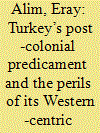

|
|
|
|
|
| Summary/Abstract |
Turkey’s relations with the post-colonial world have been marked by aloofness.1 Despite priding itself on having achieved a free and independent state after waging a war of independence against European powers following the defeat of the Ottoman Empire in the First World War, Turkey, for most of its republican history, has given secondary importance to its relations with the Third World.2 Even when Turkey did build warm relations with post-colonial nations, it did so with those that were politically pro-Western, such as US-backed East Asian states. During the Cold War in particular, Turkey’s foreign policy approach was based on privileging the country’s relations with the West over non-aligned post-colonial nations. This meant that a significant part of the Global South stayed out of Turkey’s foreign policy orbit
|
|
|
|
|
|
|
|
|
|
|
|
|
|
|
|
|
|
|
|
|